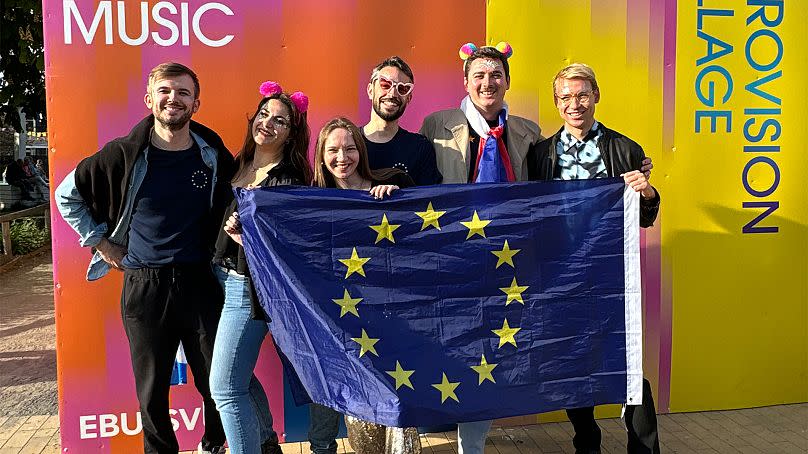My European flag was confiscated at Eurovision — this is why it's wrong

I first watched the Eurovision Song Contest when I was 11 years old. It was the year Moldova participated for the first time, and Zdob si Zdub's “Grandma” managed to secure 6th place. Since then, I have become one of the competition’s biggest fans.
Today, Eurovision continues to be the most exciting European event of the year for hundreds of millions who tune in to watch the show in May, uniting people on the European continent and beyond through music.
However, Eurovision left a bitter taste for me and my friends this year, tarnishing what should have been a joyous occasion.
Amidst the mishaps and the drama surrounding the show this year, the disappointment and frustration that my group of friends from Moldova, Greece, Spain, France, and Austria experienced struck pretty hard.
We were the ones who brought the European flag to the arena in Malmo, and we were the ones who faced the unexpected confiscation of our cherished symbol under the guise of political neutrality.
Security informed us that the EBU had banned the flag inside the arena. This revelation was even more confusing given that last year, we were actually handed European flags upon entering the venue in post-Brexit Liverpool.
'We want to live under a blue star'
The European flag has become more than just a representation of a political entity — it embodies the aspirations and ideals of an entire generation.
For us, young people from all corners of Europe, the European flag is a unifying symbol that transcends borders, cultures, and languages. It symbolises our collective desire to live in a Europe where freedom, peace, and cooperation reign supreme.
Its presence is a powerful reminder of the shared values that bind us as Europeans, whether in the EU, Ukraine, Georgia, or my beloved Moldova — a country that is fighting against particularly unfavorable odds to become closer to the rest of Europe.

As a child, I fondly recall my parents and I singing a very popular song from the early 1990s, a time when Moldova was striving for independence amidst the Soviet Union's resistance.
The lyrics went: "Let us live in peace for once/We want to live under a blue star/The way the heart desires" — which I've always interpreted as a direct allusion to the European flag and its embodiment of freedom and peace.
The EBU's decision to ban the European flag from Eurovision festivities was not only misguided but also undermined the very essence of what the contest claims to stand for — bringing people together.
While I understand the EBU's desire to maintain political neutrality, I believe they have failed to recognise the flag's significance as a transnational and supraethnic symbol, one whose explicit goal is to minimise political infighting among nations.
It's time to come together for Europe
The flag is not a political statement, but a symbol of the world we aspire to live in.
Its absence at Eurovision thus feels like a missed opportunity and a step backwards in our collective journey towards a more cohesive and integrated Europe.
We were six friends from different corners of Europe, and we all cheered for the artists and had differing favourites.
All we all wanted was to be under one flag that united us, gave us a sense of belonging and kinship, and reinforced the notion that we are all part of the same big family — and for us, this is what the European flag represents.
The EBU must urgently reassess its position regarding the European flag. To echo the sentiments of Joost Klein's song, it's time to come together for Europe — where my friends and I want to stay until the end of our lives.
Dorin Frăsîneanu is Policy Officer for ALDE Party. In the past, he served as an adviser and Deputy Chief of Staff of former Moldovan Prime Minister Natalia Gavrilița.
Contact us at view@euronews.com to send pitches or submissions and be part of the conversation.


